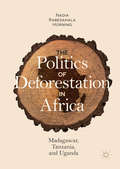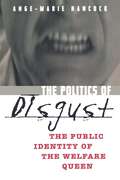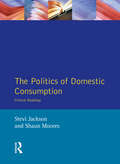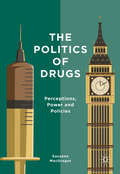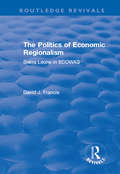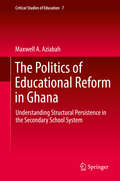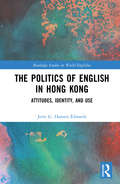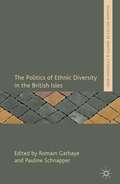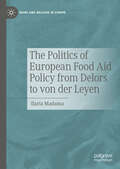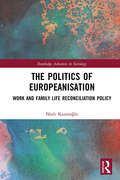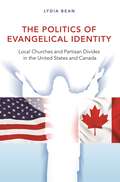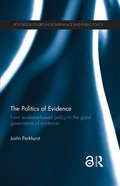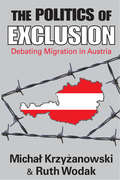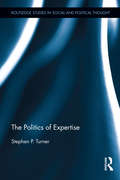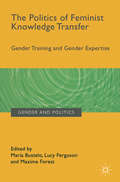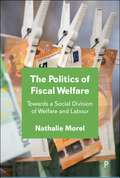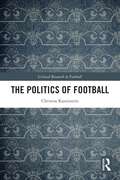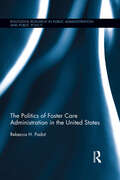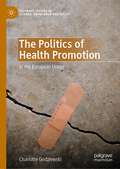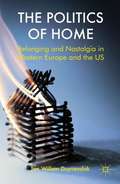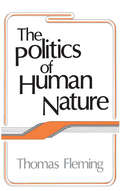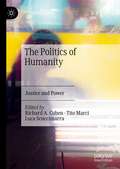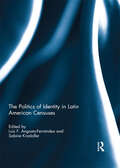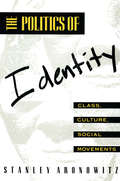- Table View
- List View
The Politics of Deforestation in Africa: Madagascar, Tanzania, And Uganda
by Nadia Rabesahala HorningThis book explores how environmental policies are made and enforced in Africa. Specifically, this project explains the gap between intent and impact of forest policies, focusing on three African societies facing persistent deforestation today: Madagascar, Tanzania, and Uganda. The central claim of the study is that deforestation persists because conservation policies and projects, which are largely underwritten by foreign donors, consistently ignore the fact that conservation is possible only under limited and specific conditions. To make the case, the author examines how decision-making power is negotiated and exercised where communities make environmental decisions daily (local level) and where environmental policies are negotiated and enacted (national level) across three distinct African political systems.
The Politics of Disgust: The Public Identity of the Welfare Queen
by Ange-Marie HancockWinner of the 2006 Race, Ethnicity, and Politics Organized Section Best First Book Award from the American Political Science Association Winner of the 2006 W.E.B. DuBois Book Award from the National Conference of Black Political Scientists Ange-Marie Hancock argues that longstanding beliefs about poor African American mothers were the foundation for the contentious 1996 welfare reform debate that effectively "ended welfare as we know it." By examining the public identity of the so-called welfare queen and its role in hindering democratic deliberation, The Politics of Disgust shows how stereotypes and politically motivated misperceptions about race, class and gender were effectively used to instigate a politics of disgust. The ongoing role of the politics of disgust in welfare policy is revealed here by using content analyses of the news media, the 1996 congressional floor debates, historical evidence and interviews with welfare recipients themselves. Hancock's incisive analysis is both compelling and disturbing, suggesting the great limits of today's democracy in guaranteeing not just fair and equitable policy outcomes, but even a fair chance for marginalized citizens to participate in the process.
The Politics of Domestic Consumption: Critical Readings
by Stevi Jackson Shaun MooresThis Reader brings together a broad range of critical work on on the everday practices and power relations of domestic consumption -drawing on material from sociology, women's studies and media and cultural studies. The book is divided into five main sections - on economics, food and clothing, leisure and media reception, household technologies, and the construction of home - and its selected contributions examine the social dynamics of gender: generation, class and ethnicity.
The Politics of Drugs
by Susanne MacgregorThis book explores the complexities of drugs policy in Britain, contradicting the over simplified representation found in the public sphere. It focuses on developments in Britain since the Misuse of Drugs Act of 1971, covering debates at national level and local experiences set in international and European context, emphasizing the interconnectivity between people and countries in this global age. Several institutions and networks are examined to illustrate how they shape the policy process as vessels for ideas and interests and as spaces for individual action. MacGregor discusses arguments around drug policy reform, in particular the role of politicians, the media and advocacy organizations. Her aim is to encourage a more open and intelligent conversation on drugs policy and to question whether the institutional architecture in place is fit for purpose given the great increase of substances available and the underlying variety of conditions and interests currently competing for attention and resources. The is a must read for all scholars of Politics, Medicine and Social Science interested in the current debate raging around British Drug Policy.
The Politics of Economic Regionalism: Sierra Leone in ECOWAS (Routledge Revivals)
by David J FrancisThis title was first published in 2001: The primary objective of this book is to provide an analytical understanding of the nature, dynamics and complexity of the politics of economic regionalism through the prism of Sierra Leone in the Economic Community of West African States (ECOWAS). The book also discusses the following issues: the evolution of economic regionalism in West Africa and the conceptual framework for analysis; the expansion of the economic regionalism; developments within the West Africa sub-region with that of the transformation of the global economy and international political system; political, economic and security developments within ECOWAS; and the civil war in Sierra Leone.
The Politics of Educational Reform in Ghana: Understanding Structural Persistence in the Secondary School System (Critical Studies of Education #7)
by Maxwell A. AziabahThis book comprises six main chapters and addresses the core research question: How can the endurance of academic bias in Ghana’s secondary education system be explained in the context of educational reform versus change of government concurrence? Six sub-questions have subsequently been derived from the core research question, enabling a comprehensive and rigorous treatment of the subject matter of investigation. The manuscript adopts an historical institutionalism approach, combining path dependency with partisan theory in explicating structural persistence in the secondary school system in Ghana. A case study methodological design procedure has been employed in the investigation of three episodes of educational reform, anchored on qualitative content analysis as the main data reduction mechanism.
The Politics of English in Hong Kong: Attitudes, Identity, and Use (Routledge Studies in World Englishes)
by Jette G. Hansen EdwardsThe focus of this book is on the impact of politics on language and identity in Hong Kong. The book is the first study to track real time language attitude changes against a divisive political landscape. It is also the most comprehensive study of language attitudes in Hong Kong to date, taking place over four years with over 1600 participants. Through both survey and interview data, a multifaceted portrait of language change in progress is presented, providing a more nuanced and complex view of language and identity than has previously been presented. The book examines the status of Hong Kong English in the light of attitudes towards Cantonese, English, and Putonghua, providing a deeper analysis of the linguistic complexity of Hong Kong; it can be argued that one cannot understand attitudes towards Hong Kong English without fully understanding the status and use of English in Hong Kong today. The book also presents a complex examination of language attitudes in Hong Kong by focusing not only on the what of language attitudes, but also the question of for whom, through an analysis of language attitudes by gender, age, identity, and speaking HKE.
The Politics of Ethnic Diversity in the British Isles
by Romain Garbaye Pauline SchnapperThis book explores continuity and change in British multiculturalism. It offers an original perspective on British multiculturalism and also presents an exploration of the politics of ethnic diversity in all the national contexts of the British Isles as well as the United Kingdom.
The Politics of European Food Aid Policy from Delors to von der Leyen (Work and Welfare in Europe)
by Ilaria MadamaThis book provides a theoretically informed, empirically grounded account of the origin, expansion, and institutionalization of the EU's action against food poverty and severe material deprivation. In doing so, the analysis spans more than three decades, from the quasi-accidental onset of the first food aid program in the late 1980s under the Common Agricultural Policy to its current, puzzling, and contested consolidation as a narrow yet symbolic element of Social Europe's architecture. More precisely, the study offers an in-depth examination of the governance and implementation of European Food Aid Policy (EFAP) while exploring the political and institutional dynamics shaping its trajectory over time. Deploying primarily a historical institutionalist approach, the book addresses two key questions: Why did EFAP emerge despite the EU&’s limited role in anti-poverty policies? And how did it survive and consolidate, particularly during the 2008–2014 critical juncture, despite growing adverse conditions? By treating EFAP as a &“least-likely case&” for European integration, the research sheds light on broader political and institutional dynamics behind the making of Social Europe. This in-depth study will be of key interest to scholars, students, and practitioners in the field of EU social policy and policymaking, as well as, more broadly, in EU studies and comparative welfare state research.
The Politics of Europeanisation: Work and Family Life Reconciliation Policy (Routledge Advances in Sociology)
by Nazlı KazanoğluWith the dramatic changes in the extent to which women and men contribute to unpaid domestic work and paid employment, work and family life reconciliation has become more prominent than ever on the European Union agenda. This comparative study examines the Europeanisation patterns of work and family life reconciliation policies in a longstanding candidate country, Turkey and a founding member state, Germany, over the last decade, with a particular emphasis on intervening domestic actors and factors. Combining Europeanisation literature and New Institutionalism theory, it draws on document analysis and interviews with EU representatives, German and Turkish political elites and representatives of civil society organisations to shed light on the diverging nature of the Europeanisation process in different countries. A study of the influence of local actors on the push for stronger convergence among member and candidate states on EU work and family life reconciliation policies The Politics of Europeanisation will appeal to social scientists with interests in social policy, gender studies, EU politics and the Europeanisation process.
The Politics of Evangelical Identity: Local Churches and Partisan Divides in the United States and Canada
by Lydia BeanA comparative look at evangelical churches across the U.S.-Canada border that reveals deep political differencesIt is now a common refrain among liberals that Christian Right pastors and television pundits have hijacked evangelical Christianity for partisan gain. The Politics of Evangelical Identity challenges this notion, arguing that the hijacking metaphor paints a fundamentally distorted picture of how evangelical churches have become politicized. The book reveals how the powerful coalition between evangelicals and the Republican Party is not merely a creation of political elites who have framed conservative issues in religious language, but is anchored in the lives of local congregations.Drawing on her groundbreaking research at evangelical churches near the U.S. border with Canada—two in Buffalo, New York, and two in Hamilton, Ontario—Lydia Bean compares how American and Canadian evangelicals talk about politics in congregational settings. While Canadian evangelicals share the same theology and conservative moral attitudes as their American counterparts, their politics are quite different. On the U.S. side of the border, political conservatism is woven into the very fabric of everyday religious practice. Bean shows how subtle partisan cues emerge in small group interactions as members define how "we Christians" should relate to others in the broader civic arena, while liberals are cast in the role of adversaries. She explains how the most explicit partisan cues come not from clergy but rather from lay opinion leaders who help their less politically engaged peers to link evangelical identity to conservative politics.The Politics of Evangelical Identity demonstrates how deep the ties remain between political conservatism and evangelical Christianity in America.
The Politics of Evidence: From evidence-based policy to the good governance of evidence (Routledge Studies in Governance and Public Policy)
by Justin ParkhurstThe Open Access version of this book, available at http://www.tandfebooks.com/, has been made available under a Creative Commons Attribution-Non Commercial-No Derivatives 3.0 license. There has been an enormous increase in interest in the use of evidence for public policymaking, but the vast majority of work on the subject has failed to engage with the political nature of decision making and how this influences the ways in which evidence will be used (or misused) within political areas. This book provides new insights into the nature of political bias with regards to evidence and critically considers what an ‘improved’ use of evidence would look like from a policymaking perspective. Part I describes the great potential for evidence to help achieve social goals, as well as the challenges raised by the political nature of policymaking. It explores the concern of evidence advocates that political interests drive the misuse or manipulation of evidence, as well as counter-concerns of critical policy scholars about how appeals to ‘evidence-based policy’ can depoliticise political debates. Both concerns reflect forms of bias – the first representing technical bias, whereby evidence use violates principles of scientific best practice, and the second representing issue bias in how appeals to evidence can shift political debates to particular questions or marginalise policy-relevant social concerns. Part II then draws on the fields of policy studies and cognitive psychology to understand the origins and mechanisms of both forms of bias in relation to political interests and values. It illustrates how such biases are not only common, but can be much more predictable once we recognise their origins and manifestations in policy arenas. Finally, Part III discusses ways to move forward for those seeking to improve the use of evidence in public policymaking. It explores what constitutes ‘good evidence for policy’, as well as the ‘good use of evidence’ within policy processes, and considers how to build evidence-advisory institutions that embed key principles of both scientific good practice and democratic representation. Taken as a whole, the approach promoted is termed the ‘good governance of evidence’ – a concept that represents the use of rigorous, systematic and technically valid pieces of evidence within decision-making processes that are representative of, and accountable to, populations served.
The Politics of Exclusion: Debating Migration in Austria
by Michal KrzyzanowskiIn many European countries the extreme right have refined their electoral programmes under the rubric of nationalist-populist slogans and have adopted subtle forms of racism. The move away from overt neo-fascist discourse has, allowed these parties to expand their electoral support as populist nationalist parties. Paradoxically, this has led to an increase in racist and anti-Semitic discourse. In this on-site analysis, Michal Krzyzanowski and Ruth Wodak describe a confluence of racism and xenophobia, and show how that union creates a new kind of racism.The "new" racism differs from the older kinds in that it is usually not expressed in overtly racial terms. Instead, the justifications that are typically employed concern protecting jobs, eliminating abuse of welfare benefits, or cultural incompatibilities. The new racism exploits xenophobia rooted in ethnocentrism, male chauvinism, and ordinary prejudices that are often unconscious or routinized. For these reasons, the new racism can be defined as "syncretic," a mixture of many, sometimes contradictory, racist and xenophobic beliefs and stereotypes.Racism as ideology and practice is alive and well. This important book aims to provide understanding of the many socio-political and historical processes involved in such expressions of institutional and individual racism--processes which are not necessarily evident from more overt or traditional expressions of racism. This is an innovative look at the political study of language as well as new instances of race, ethnicity, and class in present-day Europe.
The Politics of Expertise (Routledge Studies in Social and Political Thought #82)
by Stephen P. TurnerThis book collects case studies and theoretical papers on expertise, focusing on four major themes: legitimation, the aggregation of knowledge, the distribution of knowledge and the distribution of power. It focuses on the institutional means by which the distribution of knowledge and the distribution of power are connected, and how the problems of aggregating knowledge and legitimating it are solved by these structures. The radical novelty of this approach is that it places the traditional discussion of expertise in democracy into a much larger framework of knowledge and power relations, and in addition begins to raise the questions of epistemology that a serious account of these problems requires.
The Politics of Feminist Knowledge Transfer: Gender Training and Gender Expertise (Gender and Politics)
by Maxime Forest Lucy Ferguson Mar�a BusteloThe Politics of Feminist Knowledge Transfer draws together analytical work on gender training and gender expertise. Its chapters critically reflect on the politics of feminist knowledge transfer, understood as an inherently political, dynamic and contested process, the overall aim of which is to transform gendered power relations in pursuit of more equal societies, workplaces, and policies. At its core, the work explores the relationship between gender expertise, gender training, and broader processes of feminist transformation arising from knowledge transfer activities. Examining these in a reflective way, the book brings a primarily practice-based debate into the academic arena. With contributions from authors of diverse backgrounds, including academics, practitioners and representatives of gender training institutions, the editors combine a focus on gender expertise and gender training, with more theory-focused chapters.
The Politics of Fiscal Welfare: Towards a Social Division of Welfare and Labour
by Nathalie MorelFiscal welfare (or social tax expenditures) is a policy instrument associated with Liberal welfare states that has been on the rise across many European welfare states. This book sheds light on the use and effects of fiscal welfare in France and Sweden. Focusing on the introduction of a 50% tax deduction on domiciliary care and household services, it explores the politics behind this scheme, its effects on care provision as well as on labour market dualisation, highlighting how fiscal welfare contributes to structuring both a social division of welfare and a social division of labour. This ground-breaking book opens a new field of research by exploring fiscal welfare, the political uses of this policy instrument, the patterns of inequalities it gives rise to and its policy feedback effects.
The Politics of Football (Critical Research in Football)
by Christos KassimerisThis book examines the deep connections between football and politics and explains what those relationships can tell us about sport and wider society. With the game occupying a preeminent place on the world sporting stage, this book argues that the political significance of football has never been greater. The book explores the politics of football governance and the international organisations that run the game, as well as the interaction of footballing authorities with government at all levels. It shows how football clubs and supporter groups have leaned left (such as FC Sankt Pauli) or right (such as SS Lazio) and have been significant voices in secessionist debates and the promotion of religious identities and ethno-centrism. It also addresses how fascist and communist regimes have used football to project political ideology. The book also considers key contemporary political issues in football, such as surveillance, discrimination, and human rights. This is fascinating reading for anybody with an interest in football, in the politics or sociology of sport, in international relations, government, or political ideology, or in the intersection of politics and culture.
The Politics of Foster Care Administration in the United States (Routledge Research in Public Administration and Public Policy)
by Rebecca H. PadotGovernment-by-proxy and intergovernmental relations profoundly affect the public administration of foster care. Using examples from foster care systems in the states of Delaware, Michigan, New York, and Rhode Island, Rebecca Padot eloquently combines a rigorous methodology and theory work to expose the conditions under which foster care outcomes can be improved. The cases selected suggest that the federal government has increased its focus on measuring the performance of state programs while simultaneously decreasing its funding of state foster care programs and offering the states very little management or mentorship. Padot turns the page and recommends administrators place a greater priority on building community partners, integrating the advice of mentors, providing leadership from public managers, and cultivating relationships with the federal government. An original and timely resource for scholars and practitioners, this book represents a significant contribution to our understanding of how leadership and management variables may be associated with more positive foster care practices and performance in the United States.
The Politics of Gay Marriage in Latin America: Argentina, Chile, and Mexico
by Jordi DíezAddressing one of the defining social issues of our time, The Politics of Gay Marriage in Latin America explores how and why Latin America, a culturally Catholic and historically conservative region, has become a leader among nations of the Global South, and even the Global North, in the passage of gay marriage legislation. In the first comparative study of its kind, Jordi Díez explains cross-national variation in the enactment of gay marriage in three countries: Argentina, Chile, and Mexico. Based on extensive interviews in the three countries, Díez argues that three main key factors explain variation in policy outcomes across these cases: the strength of social movement networks forged by activists in favor of gay marriage; the access to policy making afforded by particular national political institutions; and the resonance of the frames used to demand the expansion of marriage rights to same-sex couples. Makes a significant theoretical contribution by combining two approaches in the social sciences that are engaged separately: social movements and public policy. The first book to examine cross-national variation in the expansion of gay marriage in Latin America. The only volume to provide a historical comparative and systematic account of three gay and lesbian movements in Latin America.
The Politics of Health Promotion: In the European Union (Palgrave Studies in Science, Knowledge and Policy)
by Charlotte GodziewskiMuch has been written about policy efforts to achieve ‘Health in All Policies’: an ambitious attempt to improve population health and reduce health inequalities by ensuring multiple policy areas are more attuned to their health impacts. However, most accounts focus on technical challenges, such as implementing impact assessments. In contrast, and focusing on the European Union, this book argues that ‘Health in All Policies’ is essentially a political project shaped by institutional power, competing ideas, and discourses. We can only really understand the failure to realise its ambition through political analysis.
The Politics of Home
by Jan Willem DuyvendakThis book examines ideas of 'home' of Americans and Western Europeans under the influence of the two major revolutions of our times: the gender revolution and increased mobility due to globalization. It analyzes how 'home' has been politicized, as well as alternative home-making strategies that aim to transcend the 'logic of identities'.
The Politics of Human Nature
by John H. KautskyThe effort to understand human nature in a political context is a daunting challenge that has been undertaken in a variety of ways and by a myriad of disciplines through the ages. From Plato to Hobbes and Burke, to Wallas and Oakeschott in our era, efforts have been made to provide some organic framework for the political study of mankind. What has added greatly to the complexity of the task is the increasing denial, even rejection, in the positivist and behaviorist traditions, of the very notion of a human nature.The work can be described as a series of interlocking propositions: the proverbial view of human nature can be explained by evolutionary theory. Biological differences between men and women are responsible for family, community and group life. Social evolution goes through stages which are recapitulated in the moral life of individuals. A well-defined federal system mirrors human development. And finally, for Fleming, most problems in social and political life stem from violations of this federalist system.Fleming's volume takes up a variety of issues: sex and gender differences, democracy and dictatorship, individual and familial patterns of association. He does so in the context of showing how forms of legitimate authority such as families, communities and nations establish such authority by appeals to human nature, and that these appeals, while presumably resting on empirical evidence, also confirm the existence of normative structures. Fleming's work is an effort of synthesis that is sure to arouse discussion and debate. It represents a serious addition to a literature retrieved from the historical dustbins to which it has been repeatedly consigned.
The Politics of Humanity: Justice and Power
by Richard A. Cohen Tito Marci Luca ScuccimarraThis book is the collaborative response of engaged scholars from diverse countries and disciplines who are disturbed by the contemporary resurgence of anti-democratic movements and regimes throughout the world. These movements have manifest in vitriolic “nationalist” polemics, state-supported violence, and exclusionary anti-immigrant policies, less than a century after the rise and fall and horrific devastations of fascism in the early 20th century.
The Politics of Identity in Latin American Censuses
by Luis F. Angosto-Ferrández and Sabine KradolferThe Politics of Identity in Latin American Censuses contributes new and original perspectives to existing discussions about the shaping of multiculturalist ideology in Latin America, its interweaving with the cultural politics of neoliberalism and the relation between ethnic identification resurgence and economic globalization. Scrutinising national censuses across the continent, the studies included in this volume reveal clear relationships between censuses, nation-building and government projects, but also strong and determinant connections between domestic and supra-national spheres. The contributors to this volume open provocative avenues of research on Latin American societies by demonstrating how, in the realm of identity politics, supra-national institutions and normativity socialise national census bureaus in a way that largely annuls ideological differences between regional governments. This book was originally published as a special issue of the Journal of Iberian and Latin American Research.
The Politics of Identity: Class, Culture, Social Movements
by Stanley AronowitzIn The Politics of Identity, Stanley Aronowitz offers provocative analysis of the complex interactions of class, politics, and culture. Beginning with the premise that culture is constitutive of class identities, he demonstrates that while feminist analyses of both racial and gay movements have discussed these components of culture, class contributions to cultural identity have yet to be fully examined. In these essays, he uses class as a category for cultural analysis, ranging over issues of ethnicity, race and gender, portrayals of class and culture in the media, as well as a range of other issues related to postmodernism.
